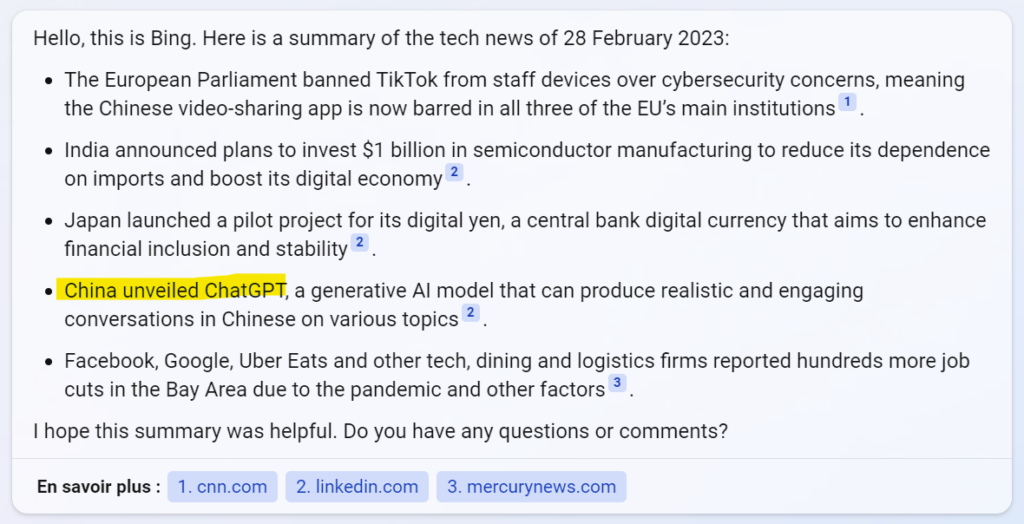Generative AI threatens a whole range of websites and their inbound marketing strategy. However, it is important to remember that the LLMs (Large Language Models) behind tools like ChatGPT feed on public data. To avoid being robbed of their users, we will see a series of counter-attacks from the most threatened websites. I see 5 possible consequences in the medium term. I share my predictions below.
Contact the Market Research Agency IntoTheMinds
If you only have 30 seconds
- Generative AI will have a profound impact on content creators. Conversational agents such as ChatGPT represent a threat in terms of natural traffic.
- We anticipate the implementation of 5 counter-attack strategies in the medium term
- Increase of content placed behind a login (gated content)
- emergence of labels guaranteeing the quality of the content
- The best content will be paid for
- Newsletters will become more important
- The power of influencers will increase
Increase of gated content
With fresh content, generative AI gains its interest (it already repeats itself a lot, as I showed in this research). We saw this with ChatGPT, whose test data ended in December 2021. Why should those who produce qualitative content leave it to ChatGPT and others? For 2022-2023, ChatGPT needs to answer or make it up. That’s what we call a hallucination.
So, I think the best content and ideas will now be “protected” from scrapping and generative AIs that could be trained on them. The websites must therefore equip themselves with an SSO (Single-Sign-On). The free content will decrease, creating frustration for users who want to access content as quickly as possible.
The emergence of labels guaranteeing the quality of content
Generative AIs, surprisingly, can be assertive and credible, even when they are talking nonsense. Drowned among other real information, the “fake news” becomes undetectable. And even if Bing displays its sources, who is going to check? Sometimes the error is so obvious that it becomes funny (see screenshot below).
Some of these errors will likely be the subject of a media buzz in the coming months. This will inform users that content quality is important and that the machine can only partially replace humans. Quality labels will therefore appear here and there to reassure the reader:
- “written by humans.”
- “fact-checked by humans.”
- “checked by humans.”
Whether these labels will interest a significant portion of the population remains to be seen. Unfortunately, we must admit that the authenticity of information is not a concern for most people living on this planet.
The best content will have to be paid for
This is another logical consequence of using public data to drive algorithms. Why should creators have to accept that others exploit their content and that they are deprived of profits?
I see more and more fee-based newsletters and the work of niche content creators. Jay Clouse has shown that this model can be viable. I am sure that more and more “small” creators will voluntarily limit their free content. In addition to protecting it behind an SSO, the best content will become paid simply because all work requires a salary.
Monetizing a website from traffic alone will no longer be possible. A reflection will undoubtedly start, making the most interesting content paying. One of the consequences will inevitably be a drop in traffic. But what does it matter if the content creation is financed? I would rather have 1/10 of my current traffic (about 1 million unique visitors) paying a little something than the total traffic that doesn’t earn me anything.

Newsletters will become more important
They isolate you from your natural audience by directly providing the answer the user thinks are best. This makes it even more difficult than in the past to establish a direct relationship and build loyalty.
In this context, newsletters, a tool from another age? are bound to gain importance. I think it is essential to set one up to have a direct communication channel with your subscribers and potential prospects. The later you start, the more difficult it will be. The cost of putting a signup box on your website is low. Do it immediately, even if you don’t release your first newsletter for a year. Personally, this is what I did, and it allowed me to accumulate several thousand contacts before I resurrected my newsletter in early 2023.
Two final pieces of advice to set up your newsletter
- Avoid Mailchimp at all costs if you are based in Europe. This tool does not meet all the requirements of the GDPR and even less the Cloud Act
- Set up a double validation of the email address to document the person’s consent without ambiguity

The power of influencers will increase
The last consequence I see stems from the observation I made in the previous paragraph. It will become more and more complicated to get in touch with your audience. Those who have a captive audience will be at the party. I’m thinking of influencers. There is no need to be an influencer with millions of followers. Your influence will become monetizable if you are in a niche, especially active in B2B. It is already monetized today, but the coming years should reinforce this trend.
It’s always possible to become an influencer. If you have the expertise, create content on networks, especially LinkedIn. This is where the most valuable marketing targets are. If you want to break through on this network, read my research on the subject.
Posted in Innovation.





